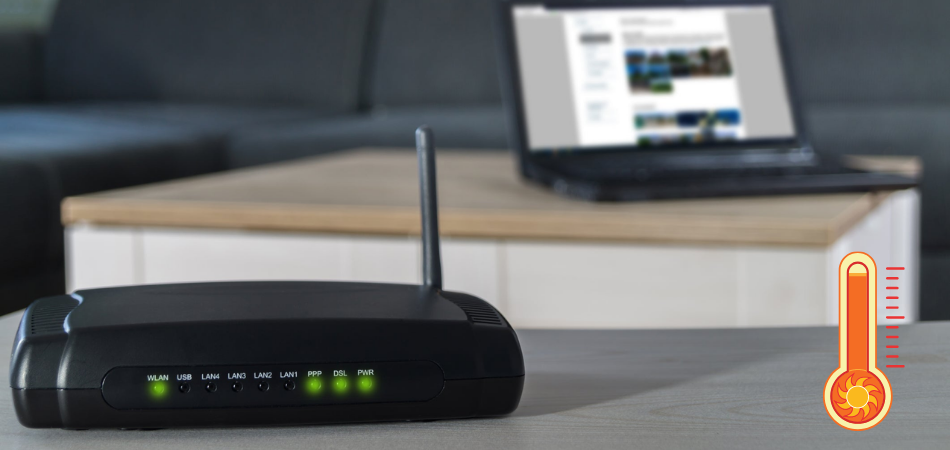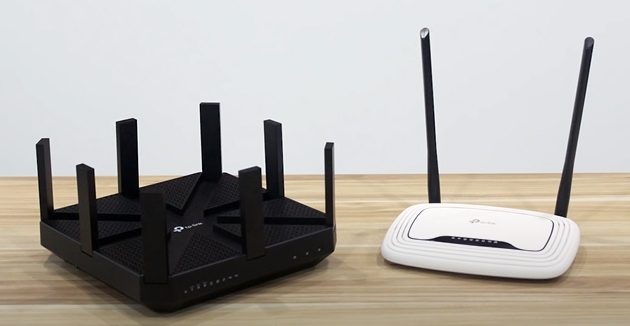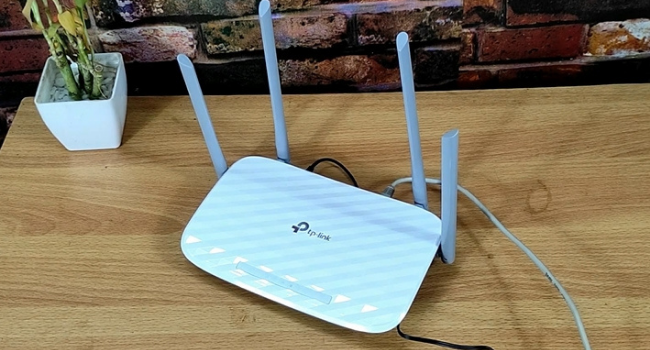Routers are one essential network device that connects your smartphones, gadgets, and computers with the internet. When you buy a router, it usually comes with a setup guide that helps you set up the router and use it properly. But if anything goes, can a router overheat?
Yes, a router can overheat when exposed to too much heat. Routers need to be placed in cool spots or have cooling fans to keep them chill for safety reasons. The most common reason for a router to overheat is that the fan stopped working or due to some other external factors.
Routers are made to last, and they are built to take the beating during long-time usage. However, like all-electric tools, it is best to be careful when using a router as you do not want something worth a whole lot of money to overheat and malfunction.
Also, since it has moving parts inside and is a motor that spins very fast, there are dangers if it does get too hot. This article will also show you a few tricks to help avoid the most common router overheating problems.
Article Summary:
- An old router is prone to overheat, and the way to solve the issue is to opt for an upgrade.
- Too much environmental temperature will have a great impact on the heat buildup in your router.
- Placing your router closer to any other electrical device will increase the chance of overheating.
- Exposure to dust, debris, and all other forms of dirt can clog the router fan and cause overheating.
- Exposure to direct sunlight can lead to overheating of the router and affect the functionality of the device.
Can a Router Overheat?
Yes, routers do overheat. Heating of any sort can cause a router to overheat and potentially catch fire or otherwise become damaged. Interruption with internet speed or connection could be an early sign that your router is overheating.
Sadly, we do many things that may make the router overheat, unaware of the consequences. For example, when the router is being used and pushed to its limits, a lot of heat may be generated inside.

However, most modern routers have a heat sensor that detects when the temperature exceeds normal values. It thus helps to shut down the router most times to prevent future damages.
Also, before the router gets too hot and shuts down, some give signs. In most cases, the overheating condition is signaled either by light or by a beep.
Why Do Wi-Fi Routers Overheat?
The routing processor inside the router is constantly sending and receiving wireless signals throughout the whole house. This process consumes a lot of power and generates excess heat. If the heat is not properly released, you’ll find your router overheating and may even lead to malfunction.

Generally, some basic factors make your wi-fi routers overheat, and they include:
Clogged Air Vents
Router overheating is caused by improper airflow in the area surrounding the router. Clogged air vents are most often the cause of router problems. So, you should never place your router in a box or an enclosed area.
The thing is, your router gets hot when too much heat builds up inside. And if your router overheats, you are more likely to suffer from slow internet and service interruptions during peak hours. Therefore, you need to position the router in a place where it is well exposed to air.
As long as there is proper ventilation where you position the router, overheating is not one of the challenges you will face.
Poor Router Design
Routers are notoriously vulnerable to overheating. This is due mostly to poor router design. They simply can’t dissipate enough heat and are made from cheap materials. Even with a large fan, the router can get hot and drop speed.
A poorly designed case, often plastic, will trap hot air. This can quickly elevate temperatures to dangerous or even hazardous levels. So, when you are getting your router, you need to carefully consider the design and the quality of its material.
Connecting “Too Many” Devices
Did you know that having too many devices connected simultaneously can cause your WiFi router to overheat? It’s true. If you have too many computers, smartphones, and tablets using the Internet simultaneously, it could slow down internet connection.
Pushing the router to its limits causes overcrowding, meaning you’ll lose some bandwidth. But you may not know that connecting too many devices could result in overheating for the router as well.
In that sense, the best thing to do is never overload the router. You should minimize the number of devices on it to minimize the heat buildup.
Also, if you notice that your router loses connection, especially during high-bandwidth activities like video streaming or gaming, you should check for overheating.
Climate Condition
Having a hot environment can create more heat on your router, at times causing it to run slower or shut down. During hot summer days, the temperature gets high. So, the heat trapped inside a router releases slower than usual, leading to heat build-up inside the router.
Also, you need to be careful where you place or position the router. Any direct exposure to heat or sunlight will increase the temperature and lead to overheating. You need to place it in a place that is open to the free flow of air and not closer to any object generating heat.
Placing Near Other Devices
If your router is placed in a hot spot or a place too Close to any electronic devices, the heat generated by them will be conducted to the router, causing it to overheat.
Therefore, you should keep the router in a well-ventilated place, avoiding any contact with a wall, air conditioner ductwork, or any other equipment capable of producing a lot of heat.
Temperature changes may cause your router to kick the bucket prematurely, and these temperature variations can be caused by placing it near other electronic devices.
Related Reading: Does Having Two Routers Slow Down the Internet?
What Happens If Your Router Gets Overheated?
If your router ever gets too hot, it will slow down or shut off. If this happens, just shut it down and let it cool off for a bit. Once the router has cooled and the indicator light on the router has stopped flashing, you can power up the machine again.

Remember to avoid overheating your router to maintain its internal integrity. But what are the things that are likely to happen if the router gets overheated?
Loss of Connection
If your router gets too hot, the first symptom might be that you lose your WiFi connection. Other symptoms can include the router making odd noises and bright red/orange lights flashing on your router.
Your network speed and the amount of time connected are vital to happy Internet browsing. With an overheating router, you could be experiencing a loss of internet connectivity. So, once you notice your device is not connecting to the internet, you might want to check your router for overheating.
Slow Internet Speed
Your router may also overheat during heavy internet usage and cause your internet connection to freeze or slow down. It is caused by the insufficient cooling capabilities of many routers. If your internet speed is slow or down, you can trace it down to a router experiencing overheating.
Damages to the Router Components
Preventing router overheating will help reduce the risk of costly damage to your router and its components. Your router can easily get damaged if it gets overheated. You can easily fix some damages, but some problems will require you to get a new one.
How to Prevent a Router from Overheating?
Do you have a frequent overheating problem with your router, and are you on the lookout for the best possible ways to prevent overheating? You are just in the right place.
Prevent dust and debris
Dust and debris can build up on the motor of a router and cause excessive friction, causing the motor to overheat. You can solve this problem through two methods. The first is through the use of a compressor air kit, and the second is by placing it in an airflow container to block out dust.
Installing a cooling fan
Sometimes a cooling system might seem like an over exaggerated way of preventing overheating, but it works wonders. You just need to place your router near a cooling fan or in a room with an AC system in operation.
The cool atmosphere will help to keep your router cool and ensure there is no chance for overheating to take place.
Avoid connecting too many devices
The primary function is to get you connected at all times but overloading it will surely affect the effectiveness and performance. It is the reason some modern routers come with limitations on the number of devices you can connect at once.
Therefore, if you want to ensure your router doesn’t always encounter overheating, then you should stop overloading it with many devices at once.
Avoid exposure to heat
As you know that exposure to direct sunlight or heat can make your router too hot, you need to avoid such. Your best chance at keeping the device working optimally with less chance of heat buildup is by avoiding direct contact with the sun.
In addition, you should avoid placing the router near any hot object or device. Other electrical devices should be placed far away from the router to prevent overheating.
To prevent overheating, wireless routers are designed to create a cooling fan to ventilate the heat generated by the wireless radio inside of the router. Everything wireless must get rid of excess heat to function properly.
Conclusion
Internet routers are an amazing invention that makes sharing and accessing internet resources easier, faster, and cheaper. But can a router overheat? Now you know it can, and the heat produced from the router can badly affect the overall performance or lifespan.
Therefore, as a user, you should understand how to manage routers and ensure it doesn’t overheat. After all, taking steps to prevent overheating only leads to one direction- a steady, super fast, and uninterrupted internet connection. So why not try them out?